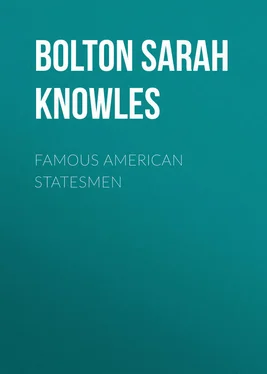Sarah Bolton - Famous American Statesmen
Здесь есть возможность читать онлайн «Sarah Bolton - Famous American Statesmen» — ознакомительный отрывок электронной книги совершенно бесплатно, а после прочтения отрывка купить полную версию. В некоторых случаях можно слушать аудио, скачать через торрент в формате fb2 и присутствует краткое содержание. ISBN: , Жанр: foreign_prose, foreign_antique, foreign_language, на английском языке. Описание произведения, (предисловие) а так же отзывы посетителей доступны на портале библиотеки ЛибКат.
- Название:Famous American Statesmen
- Автор:
- Жанр:
- Год:неизвестен
- ISBN:http://www.gutenberg.org/ebooks/39012
- Рейтинг книги:5 / 5. Голосов: 1
-
Избранное:Добавить в избранное
- Отзывы:
-
Ваша оценка:
- 100
- 1
- 2
- 3
- 4
- 5
Famous American Statesmen: краткое содержание, описание и аннотация
Предлагаем к чтению аннотацию, описание, краткое содержание или предисловие (зависит от того, что написал сам автор книги «Famous American Statesmen»). Если вы не нашли необходимую информацию о книге — напишите в комментариях, мы постараемся отыскать её.
Famous American Statesmen — читать онлайн ознакомительный отрывок
Ниже представлен текст книги, разбитый по страницам. Система сохранения места последней прочитанной страницы, позволяет с удобством читать онлайн бесплатно книгу «Famous American Statesmen», без необходимости каждый раз заново искать на чём Вы остановились. Поставьте закладку, и сможете в любой момент перейти на страницу, на которой закончили чтение.
Интервал:
Закладка:
Every effort was made to capture Arnold, but without success. He once asked an American, who had been taken prisoner by the British, what his countrymen would have done with him had he been captured. The immediate reply was: "They would cut off the leg wounded in the service of your country, and bury it with the honors of war. The rest of you they would hang."
In 1781, the condition of affairs was still gloomy. Some troops mutinied for lack of pay, but when approached by Sir Henry Clinton, through two agents, offering them food and money if they would desert the American cause, the agents were promptly hanged as spies. Such was the patriotism of the half-starved and half-clothed soldiers.
In May of this year, Cornwallis took command of the English forces in Virginia, destroying about fifteen million dollars worth of property. Early in October, Washington with his troops, and Lafayette and De Rochambeau with their French troops, gathered at Yorktown, on the south bank of the York River. For ten days the siege was carried on. The French troops rendered heroic service. Washington was so in earnest that one of his aids, seeing that he was in danger, ventured to suggest that their situation was much exposed. "If you think so, you are at liberty to step back," was the grave response of the general. Shortly afterwards a musket-ball fell at Washington's feet. One of his generals grasped his arm, exclaiming, "We can't spare you yet." When the victory was finally won, Washington drew a long breath and said, "The work is done and well done." Cornwallis surrendered his whole army, over seven thousand soldiers, October 19, 1781.
The American nation was thrilled with joy and gratitude. Washington ordered divine service to be performed in the several divisions, saying, "The commander-in-chief earnestly recommends that the troops not on duty should universally attend, with that seriousness of deportment and gratitude of heart which the recognition of such reiterated and astonishing interpositions of Providence demands of us." Congress appointed a day of thanksgiving and prayer, and voted two stands of colors to Washington and two pieces of field-ordnance to the brave French commanders. When Lord North, Prime Minister of England, heard of the defeat of the British, he exclaimed, "Oh, God! it is all over!"
The nearly seven long years of war were ended, and America had become a free nation.
The articles of peace between Great Britain and the United States were not signed till September 3, 1783. On November 4 the army was disbanded, with a touching address from their idolized commander. On December 4, in the city of New York, in a building on the corner of Pearl and Broad Streets, Washington said good-bye to his officers, losing for a time his wonderful self-command. "I cannot come to each of you to take my leave," he said, "but shall be obliged if each of you will come and take me by the hand." Tears filled the eyes of all, as, silently, one by one, they clasped his hand in farewell, and passed out of his sight.
Then Washington repaired to Annapolis, where Congress was assembled, and at twelve o'clock on the 23d of December, before a crowded house, offered his resignation. "Having now finished the work assigned me, I retire from the great theatre of action; and bidding an affectionate farewell to this august body, under whose orders I have long acted, I here offer my commission, and take my leave of all the employments of public life." "Few tragedies ever drew so many tears from so many beautiful eyes," said one who was present.
The beloved general returned to Mount Vernon, to enjoy the peace and rest which he needed, and the honor of his country which he so well deserved. John Parke Custis, Mrs. Washington's only remaining child, had died, leaving four children, two of whom – Eleanor, two years old, and George Washington, six months old – the general adopted as his own. These brought additional "sweetness and light" into the beautiful home.
The following year the Marquis de Lafayette was a guest at Mount Vernon, and went to Fredericksburg to bid adieu to Washington's mother. When he spoke in high praise of the man whom he so loved and honored, Mary Washington replied quietly, "I am not surprised at what George has done, for he was always a good boy." Blessed mother-heart, that, in training her child, could look into the future, and know, for a certainty, the result of her love and progress! She died August 25, 1789.
Three years later – May 25, 1787 – a convention met at Philadelphia to form a more perfect union of the States, and frame a Constitution. Washington was made President of this convention. He had long been reading carefully the history and principles of ancient and modern confederacies, and he was intelligently prepared for the honor accorded him. When the Constitution was finished, and ready for his signature, he said: "Should the United States reject this excellent Constitution, the probability is that an opportunity will never again be offered to cancel another in peace; the next will be drawn in blood."
When the various States, after long debate, had accepted the Constitution, a President must be chosen, and that man very naturally was the man who had saved the country in the perils of war. On the way to New York, then the seat of government, Washington received a perfect ovation. The bells were rung, cannon fired, and men, women, and children thronged the way. Over the bridge crossing the Delaware the women of Trenton had erected an arch of evergreen and laurel, with the words, "The defender of the mothers will be the protector of the daughters." As he passed, young girls scattered flowers before him, singing grateful songs. How different from that crossing years before, with his worn and foot-sore army, amid the floating ice!
The streets of New York were thronged with eager, thankful people, who wept as they cheered the hero, now fifty-seven, who had given nearly his whole life to his country's service. On April 30, 1789, the inauguration took place. At nine o'clock in the morning, religious services were held in all the churches. At twelve, in the old City Hall, in Wall Street, Chancellor Livingston administered the oath of office, Washington stooping down and kissing the open Bible, on which he laid his hand; "the man," says T. W. Higginson, "whose generalship, whose patience, whose self-denial, had achieved and then preserved the liberties of the nation; the man who, greater than Cæsar, had held a kingly crown within reach, and had refused it." Washington had previously been addressed by some who believed that the Colonies needed a monarchy for strong government. Astonished and indignant, he replied: "I am much at a loss to conceive what part of my conduct could have given encouragement to an address which to me seems big with the greatest mischiefs that can befall my country." After taking the oath, all proceeded on foot to St. Paul's Church, where prayers were read.
The next four years were years of perplexity and care in the building of the nation. The great war debt, of nearly one hundred millions, must be provided for by an impoverished nation; commerce and manufactures must be developed; literature and education encouraged, and Indian outbreaks quelled. With a love of country that was above party-spirit, with a magnanimity that knew no self-aggrandizement, he led the States out of their difficulties. When his term of office expired, he would have retired gladly to Mount Vernon for life, but he could not be spared. Thomas Jefferson wrote him: "The confidence of the whole Union is centred in you… North and South will hang together, if they have you to hang on."
Again he accepted the office of President. Affairs called more than ever for wisdom. He continually counselled "mutual forbearances and temporizing yieldings on all sides." France, who had helped us so nobly, was passing through the horrors of the Revolution. The blood of kings and people was flowing. The French Republic having sent M. Genet as her minister to the United States, he attempted to fit out privateers against Great Britain. Washington knew that America could not be again plunged into a war with England without probable self-destruction; therefore he held to neutrality, and demanded the recall of Genet. The people earnestly sympathized with France, and, but for the strong man at the head of the nation, would have been led into untold calamities. The country finally came to the verge of war with France, but when Napoleon overthrew the Directory, and made himself First Consul, he wisely made peace with the United States.
Читать дальшеИнтервал:
Закладка:
Похожие книги на «Famous American Statesmen»
Представляем Вашему вниманию похожие книги на «Famous American Statesmen» списком для выбора. Мы отобрали схожую по названию и смыслу литературу в надежде предоставить читателям больше вариантов отыскать новые, интересные, ещё непрочитанные произведения.
Обсуждение, отзывы о книге «Famous American Statesmen» и просто собственные мнения читателей. Оставьте ваши комментарии, напишите, что Вы думаете о произведении, его смысле или главных героях. Укажите что конкретно понравилось, а что нет, и почему Вы так считаете.












